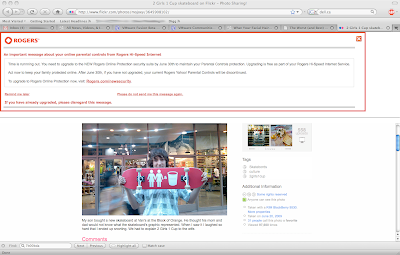Canadian Internet watchers may recall a controversy in late 2007 when Rogers began experimenting with adding its own content to webpages that its subscribers visit. The company used the technology to alert customers about their data usage. Google was one of the targets of the experiments and the company reacted […]

Telecom by yum9me (CC BY-NC-ND 2.0) https://flic.kr/p/53jSy4
Telecom
CFTPA on Bell’s Throttling Practices
P2PNet points to a submission from the Canadian Film and Television Production Association that argues that Bell's throttling practices unduly disadvantage P2P content, P2P apps, and end-users accessing legal P2P content.
Spectrum Lobbying Begins: Bell, Telus, Rogers Say They Overpaid Last Time
The lobbying over the next spectrum auction appears to have begun, with Rogers, Bell and Telus claiming that they overpaid last time due to the government's decision to create a set-aside for new entrants. The incumbent carriers express doubt that the Canadian market can support more than three big players.
Government Introduces Bill To Require Surveillance Capabilities, Mandated Subscriber Disclosure
As expected, the Government has taken another shot at lawful access legislation today, introducing a legislative package called the Investigative Powers for the 21st Century (IP21C) Act that would require mandated surveillance capabilities at Canadian ISPs, force ISPs to disclose subscriber information such as name and address, and grant the police broad new powers to obtain transmission data and force ISPs to preserve data. Although I can only go on government releases (here, here), the approach appears to be very similar to the Liberal lawful access bill of 2005 that died on the order paper (my comments on that bill here) [update: Bill C-46 and C-47]. It is pretty much exactly what law enforcement has been demanding and privacy groups have been fearing. It represents a reneging of a commitment from the previous Public Safety Minister on court oversight and will embed broad new surveillance capabilities in the Canadian Internet.
The lawful access proposal is generally divided among two sets of issues – ISP requirements and new police powers.
1. ISP requirements
There are two key components here. First, ISPs will be required to install surveillance capabilities in their networks. This feels a bit like a surveillance stimulus package, with ISPs making big new investments and the government cost-sharing by compensating for changes to existing networks. The bill again exempts smaller ISPs for three years from these requirements. While that is understandable from a cost perspective, it undermines the claims that this is an effective solution to online crime since it will result in Canadians at big ISPs facing surveillance while would-be criminals seek out smaller ISPs without surveillance capabilities.
Second, the bill requires all ISPs to surrender customer name, address, IP address, and email address information upon request without court oversight. In taking this approach, Public Safety Minister Peter Van Loan has reneged on the promise of his predecessor and cabinet colleague Stockwell Day, who pledged not to introduce mandated subscriber data disclosure without court oversight.







